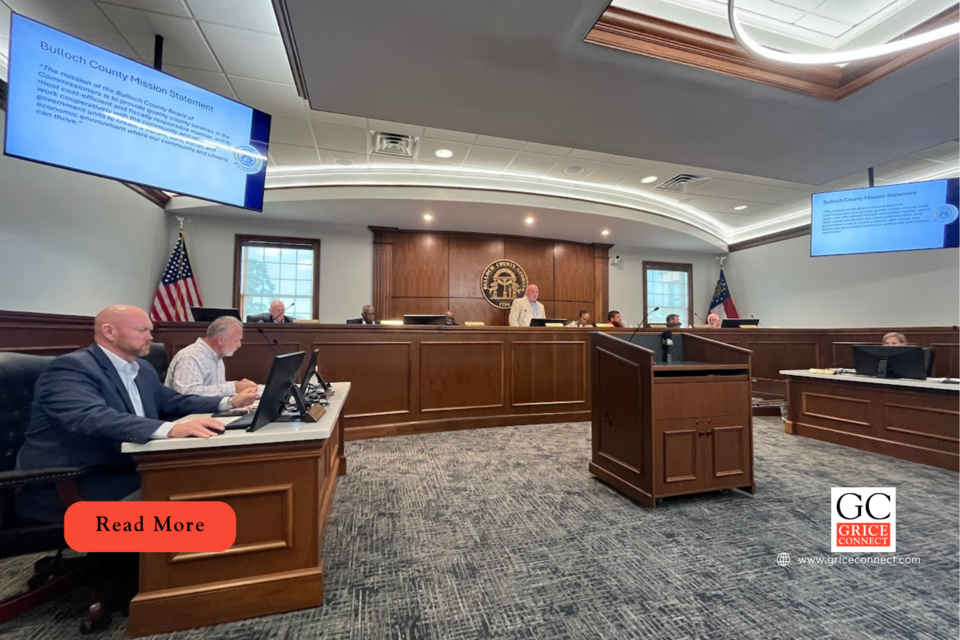During a public hearing held Wednesday evening, the Bulloch County Board of Commissioners reviewed two competing proposals for the FY 2026 budget, setting the stage for a final vote scheduled for June 26 at 5:30 p.m.
The hearing, led by Chairman David Bennett, included a detailed presentation outlining the county’s financial challenges and the consequences tied to each potential path forward: one plan maintains services at current levels with no millage rollback, while the other proposes cuts necessary to enable a full rollback and avoid a tax increase.
The following slides were provided at the meeting.
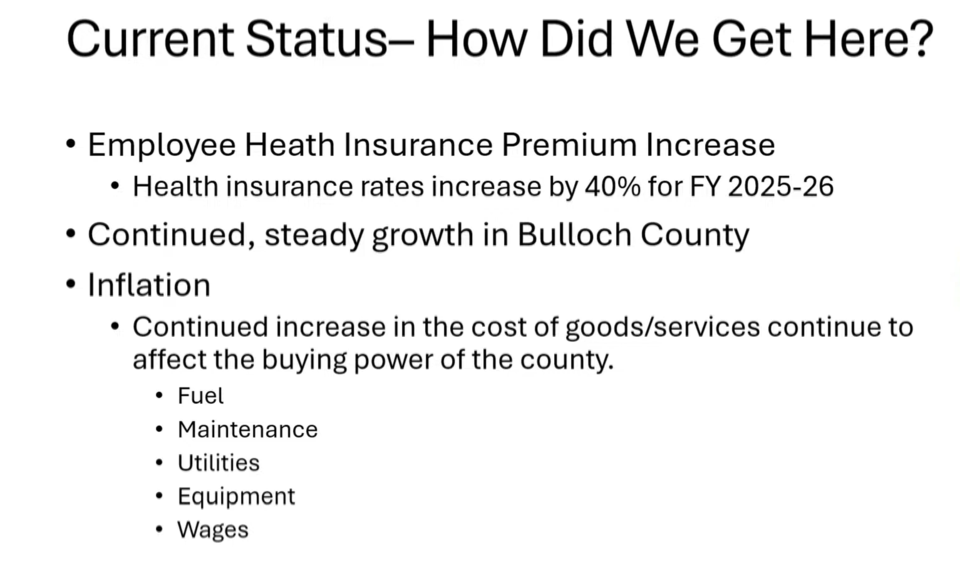
Chairman Bennett opened the presentation by noting the unique difficulties facing the county this year. These include the impact of three natural disasters, a $13 million drawdown from the fund balance for storm recovery, and inflationary pressure on fuel, wages, and equipment.
While FEMA and GEMA reimbursements have begun to arrive—approximately $5.9 million so far—there is still an outstanding balance waiting to come back to the county.
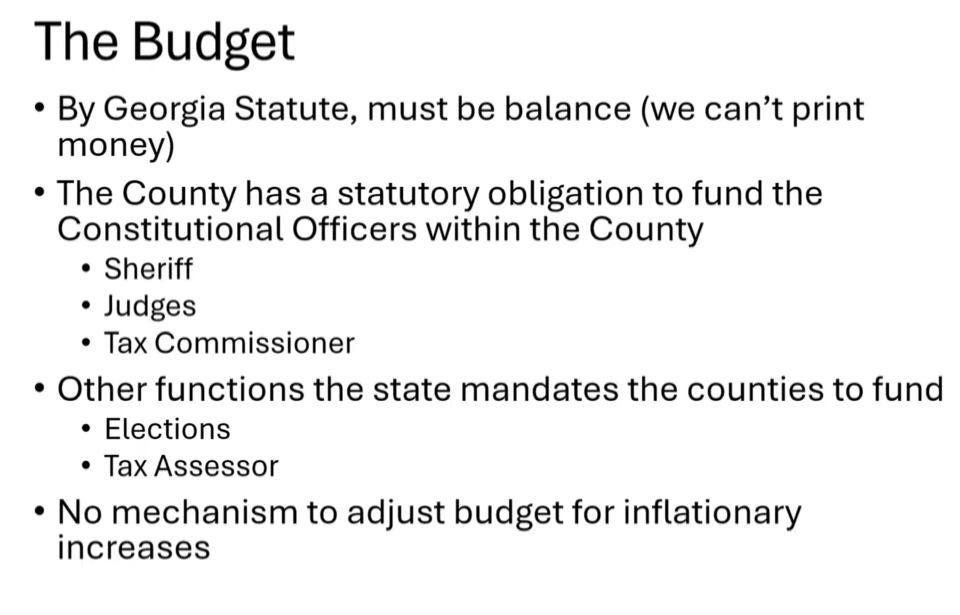
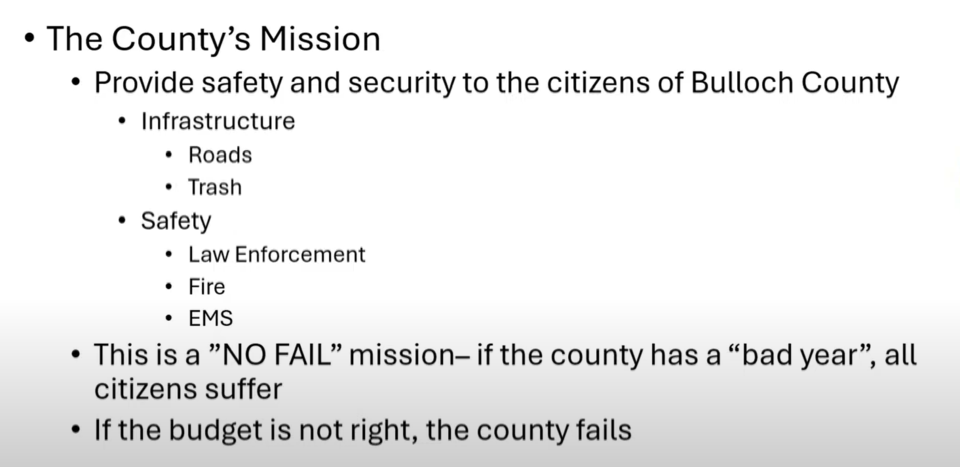
Bennett also explained the impact of House Bill 581, which introduces a floating homestead exemption that limits taxable value increases for qualifying homeowners based on the Consumer Price Index.
While intended to provide relief, the legislation reduces projected revenue growth for the county. Although the bill allows for a new 1% sales tax (FLOST) to offset property tax burdens, a referendum cannot be held until November, meaning that revenue would not be available to help close the FY26 gap.
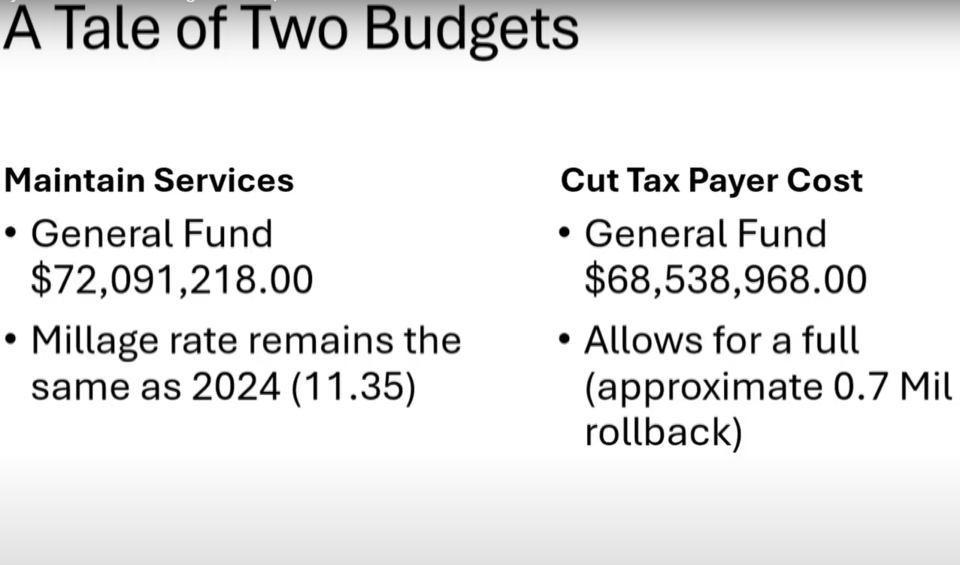
The first budget option—described as the "maintain services" budget—would preserve existing levels of public services, provide a 2% cost-of-living increase for all county employees (plus an additional 1% merit-based raise), and support the hiring of 20 new public safety employees. Eight of those would serve as School Resource Officers under a cost-sharing agreement with the Board of Education.
To close the remaining shortfall, the county would draw approximately $2.5 million from its fund balance and not roll back the current 11.35 millage rate—resulting in a tax increase under Georgia law.
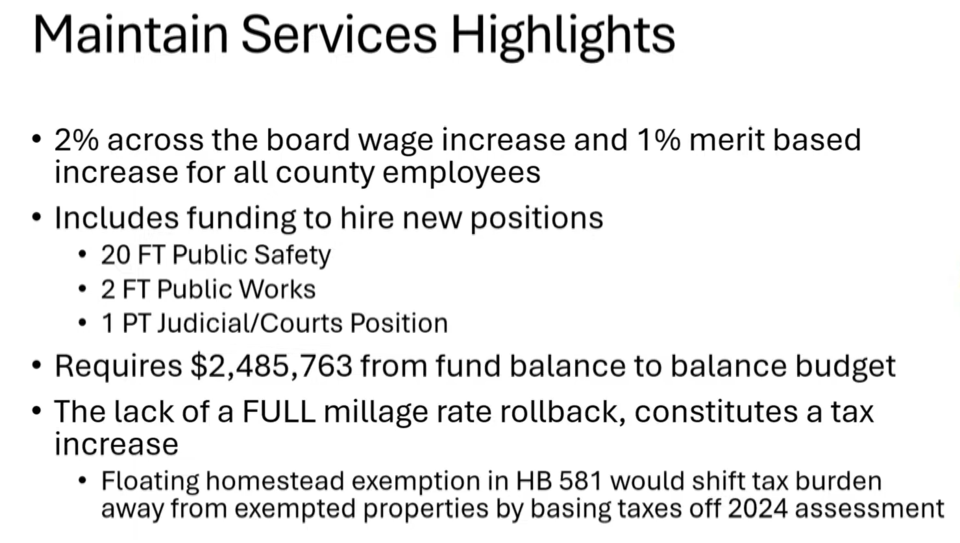
The second option, referred to as the "rollback" budget, would reduce pay raises to 1% with a 0.5% merit-based component, eliminate funding for all new hires, and cut five unfilled positions from Public Works and one from Recreation. It would also reduce training, travel, professional services, and other departmental expenses to achieve a full rollback.
Even with these reductions, the county would still need to use approximately $2 million from the fund balance to balance the budget.
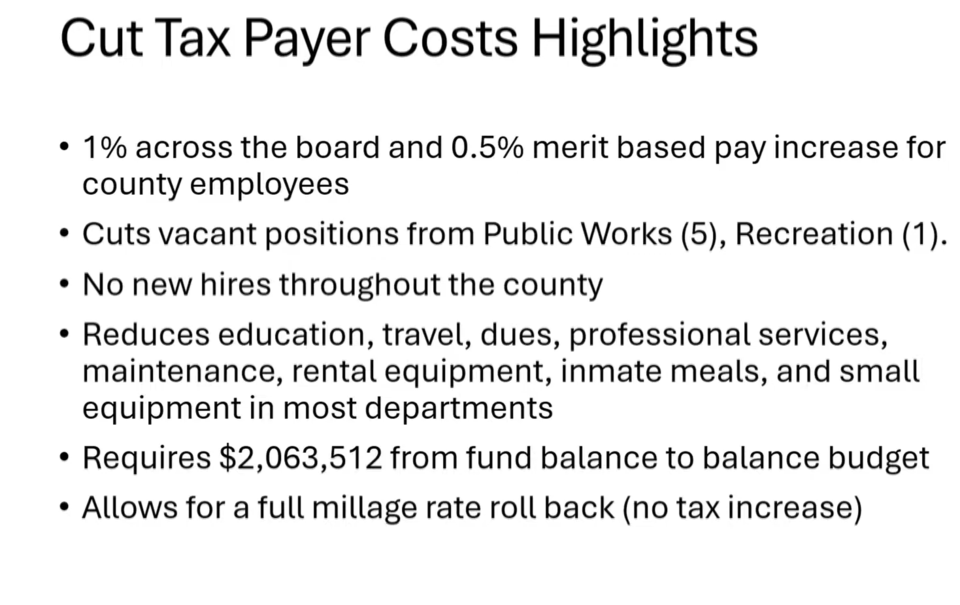
During the hearing, Bennett stated that while two options were presented publicly, only one had been fully completed in advance—prepared by CFO Kristie King and based on direction to merge the two scenarios and present the maximum feasible cuts. Bennett’s own version of the budget had not yet been finalized.
However, Commissioner Nick Newkirk submitted his recommended changes earlier that same day, which included preserving funding for six EMS positions in the Stilson area by offsetting costs with revenue from the SRO program. Newkirk emphasized that his version avoided cutting any currently filled positions and suggested reductions in discretionary expenses, such as commissioner travel and training, as a gesture of shared sacrifice. CFO Kristie King explained that these numbers are not correct. There will not be an overage from the BOE funding for SRO officers at Statesboro High School.
During the public comment portion of the hearing, six speakers addressed the commission in the following order: John Robinson, Chad Avret, Ted Redman, Lawton Sack, Cassandra Mikell, and Kathy Yawn.
Robinson, a longtime resident and recreation advocate, presented a detailed slideshow urging the board to protect funding for the Parks and Recreation Department. He emphasized the role of recreation in mental health, youth development, wellness, and community equity. “These programs are more than just fun,” he said. “They shape the future leaders of Bulloch County.”
Avret echoed those sentiments and highlighted the department’s long-standing value to the community, noting its statewide reputation and success in expanding access to rural areas like Nevils, Stilson, and soon Register. “Our Parks and Recreation Department has always thrived on serving both the young and the young at heart,” he said.
Redman asked for clarity on the county’s current financial position, confirming with Bennett that approximately $11 million remained in the fund balance after reimbursements. He also questioned whether reliance on the fund balance would become a recurring practice and how that might affect future obligations, including jail construction.
Sack criticized what he described as a “doom and gloom” framing of the situation and urged the board to explore a middle ground. While supporting full funding for constitutional offices, he questioned the scale of proposed increases in recreation and suggested that deeper budget scrutiny could reveal opportunities to reduce spending without jeopardizing public safety. “There is room in this budget to do this with a full rollback,” he said.
Mikell expressed frustration that only one completed budget had been made publicly available before the hearing. She argued that the public was deprived of the opportunity to compare both proposals in detail and proposed a citizen-led work session to review the budget line by line. Bennett noted that the timing of submissions made broader public review difficult but said the board was now at a point where a decision would have to be made.
Yawn offered a more supportive tone, acknowledging the difficulty of the commission’s decisions and underscoring the importance of both public safety and recreation. “If we have to tighten our belt, we will,” she said. “But when you're talking about cutting positions, that's livelihoods you're cutting.”
Following public comment, several commissioners shared their views. Commissioner Newkirk reiterated that his alternative recommendations avoided eliminating current positions and expressed confidence that the county could maintain key services while avoiding a tax increase—at least temporarily. He also raised concerns that projected water revenue from Bryan County and water mitigation funds had not yet been reflected in general fund planning. CFO King clarified that those revenues were tied to yet-to-be-established accounts and could not be included in the FY26 budget until more concrete data and agreements were available.
Commissioner Timmy Rushing offered a pointed warning about drawing down the fund balance too aggressively, stressing the importance of maintaining the county’s credit standing ahead of major capital projects. “We’ve got the jail coming, and everyone knows there’s a judicial annex right behind that,” Rushing said. “If it ain’t played just right today, it’s going to change the future.”
Interim County Manager Randy Tillman and Commissioner Ray Mosley both praised CFO Kristie King and the budget team for their thorough work. Tillman stated his full support for the budget King prepared, while Mosley acknowledged the difficult position the board faced, stating that last year’s rollback decision was a factor in the current shortfall.
Chairman Bennett closed the hearing by reflecting on the weight of the decision before the board. “As much as I like to lower taxes, if the choice comes down to people being harmed or their safety being compromised, or a tax increase—I will raise taxes,” he said. “There’s a lot we can do next year to improve things. But right now, the game clock has run out.”
By the end of the meeting, four of the seven commissioners had voiced support for the version of the budget that includes a tax increase. The Board of Commissioners will vote on the final FY 2026 budget during a called meeting on Thursday, June 26 at 5:30 pm.

